Google Keyword Planner
What is Google Keyword Planner?
Google Keyword Planner (GKP) is a free tool provided by Google as part of its Google Ads platform, designed to assist advertisers and digital marketers in researching and selecting keywords for search engine marketing (SEA) and search engine optimization (SEO) campaigns.
Launched in August 2013 as a replacement for the Google Keyword Tool, GKP helps users identify relevant keywords, estimate search volumes, analyze competition levels, and forecast campaign performance. It is accessible through a Google Ads account and is widely used by businesses, marketers, and content creators to optimize online visibility.
Features
Google Keyword Planner offers several key features to support keyword research and campaign planning:
- Discover New Keywords: You can input seed keywords, phrases, or website URLs to generate keyword ideas. The tool provides suggestions based on Google’s search data, including related terms and long-tail keywords.
- Search Volume and Forecasts: GKP provides estimates of average monthly searches for keywords, along with historical trends and forecasts for clicks, impressions, and conversions based on budget and bid settings.
- Competition Metrics: The tool indicates the level of competition for keywords in Google Ads, categorized as low, medium, or high, helping users gauge advertising difficulty.
- Bid Estimates: GKP offers suggested bid ranges (low and high) for keywords, aiding in budget planning for pay-per-click (PPC) campaigns.
- Filtering and Refinement: You can apply filters to exclude irrelevant keywords, focus on specific locations, languages, or devices, and refine results by categories or negative keywords.
- Ad Group Organization: Keywords can be grouped into ad groups for campaign structuring, streamlining the creation of targeted ads.
- Website-Based Suggestions: By entering a website URL, GKP generates keyword ideas based on the site’s content, which is useful for campaign planning and competitor analysis.
How It Works
To access Google Keyword Planner, you need a Google Ads account, which requires completing basic account setup, including entering billing information.
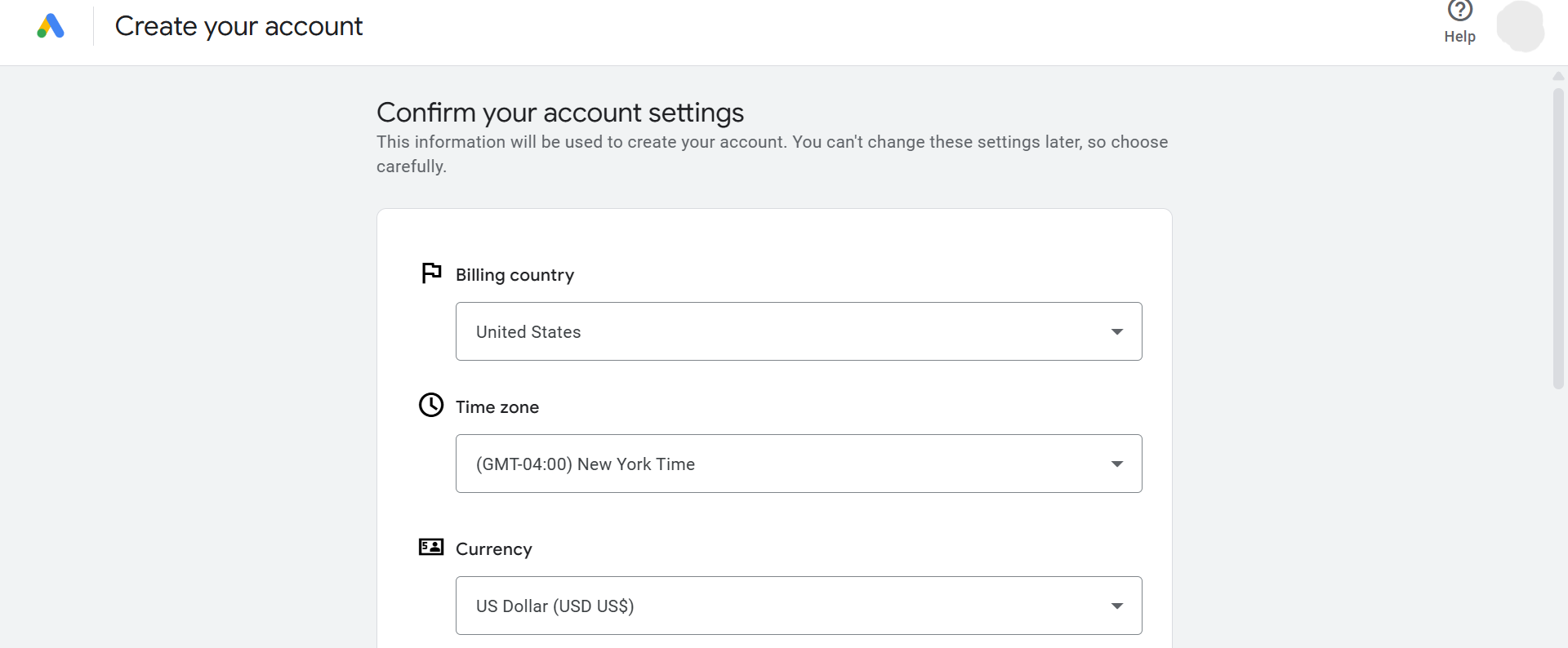
Once logged in, navigate to the “Tools” menu, select “Planning,” and choose “Keyword Planner.”
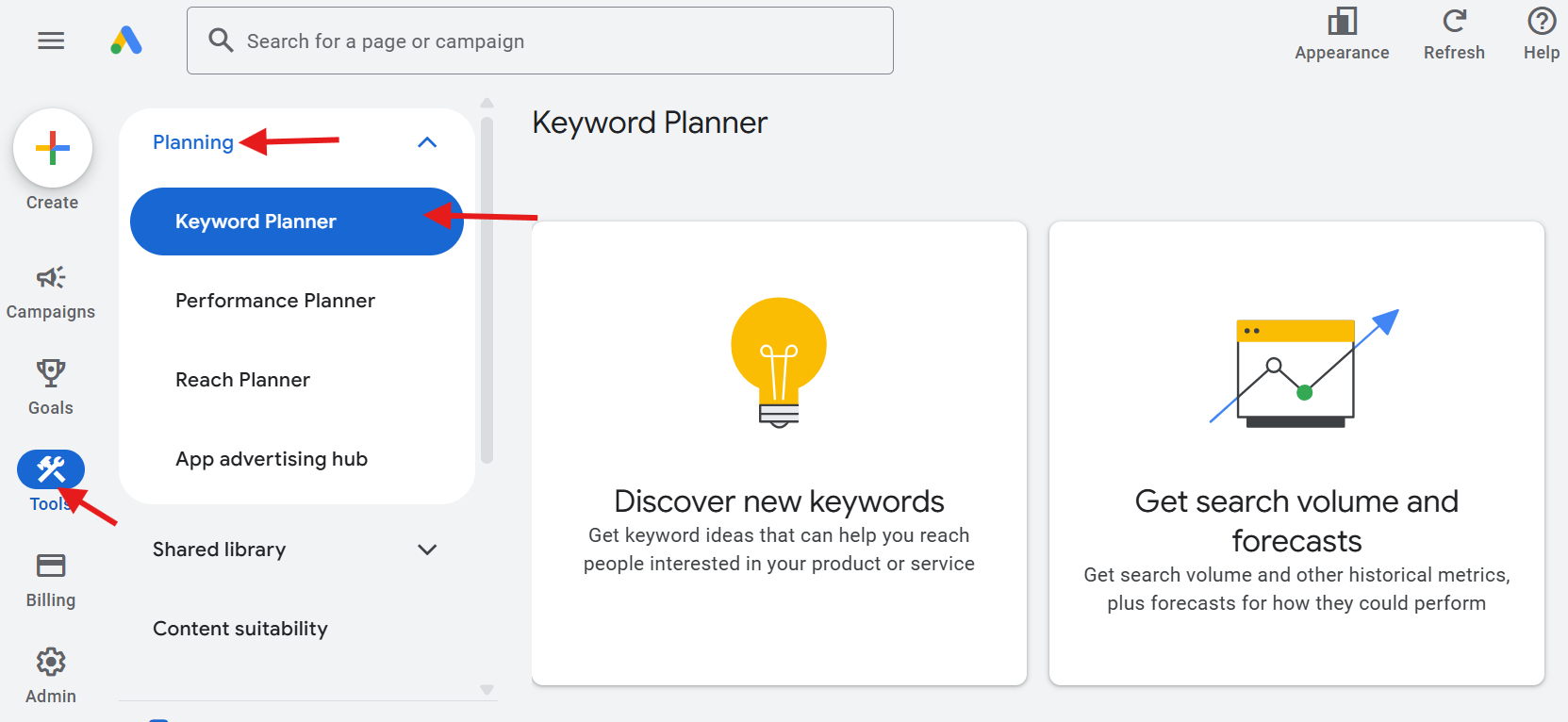
The tool offers two primary functions:
-
Discover New Keywords: Input your target keywords, a website URL, or a product category to generate ideas.
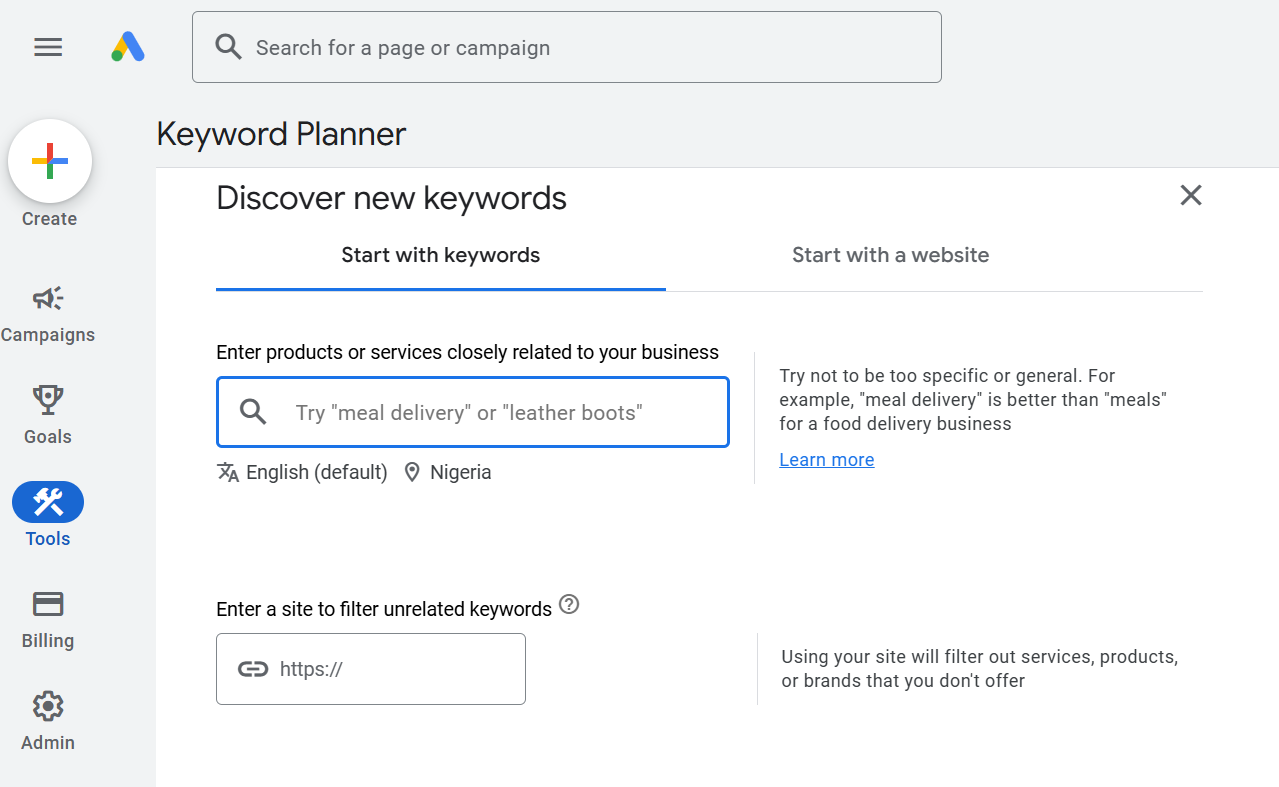
Results include keyword suggestions, average monthly searches, competition levels, and bid estimates.
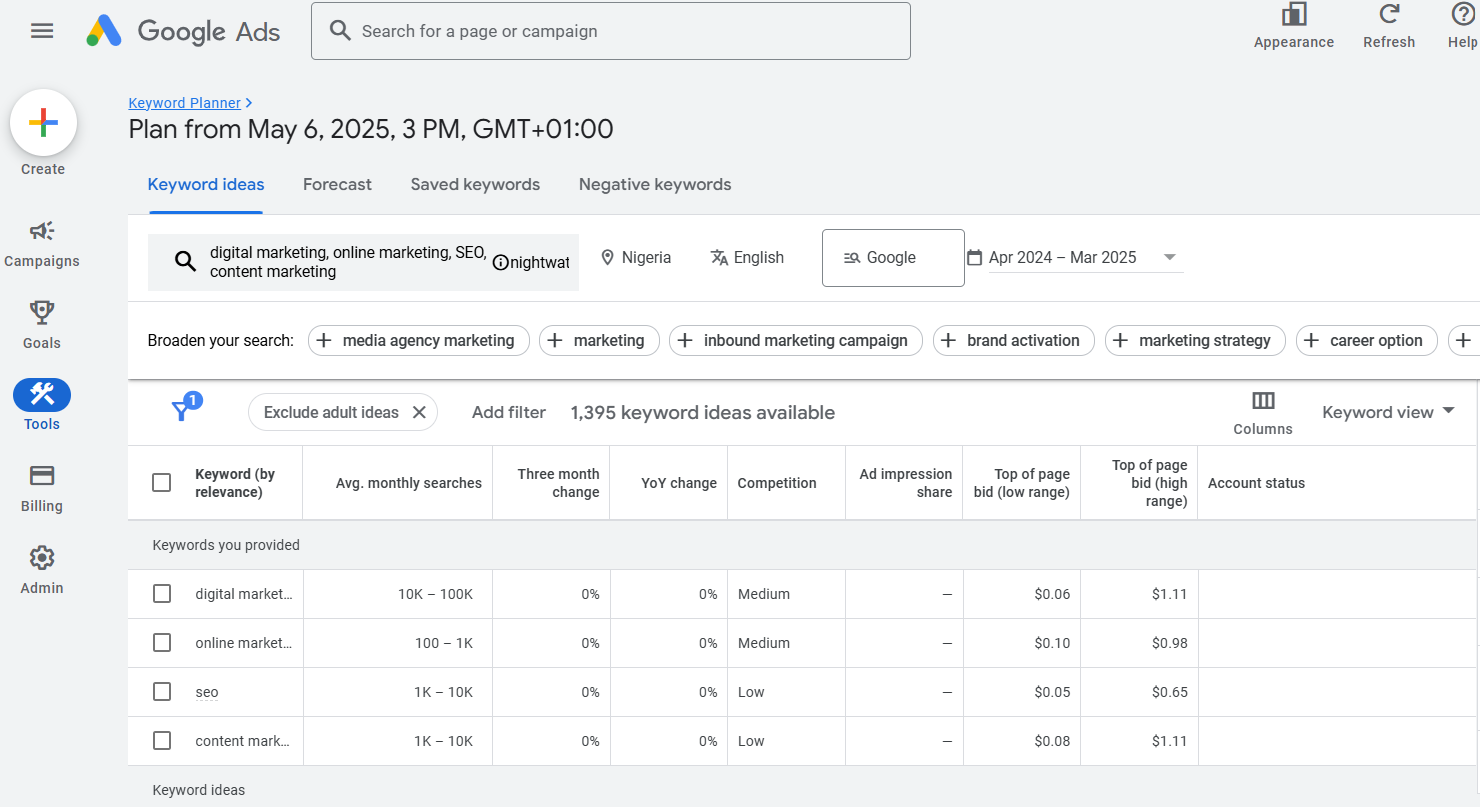
-
Get Search Volume and Forecasts: Upload a list of keywords:
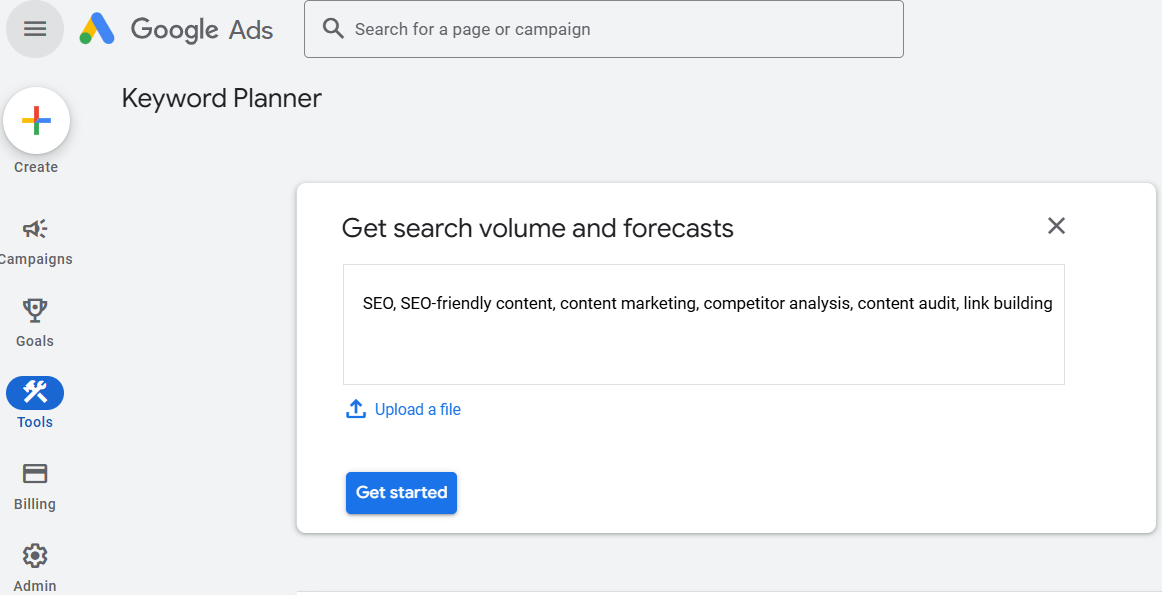
This will retrieve performance metrics, such as search volume, click-through rates, and estimated costs for a specified budget.
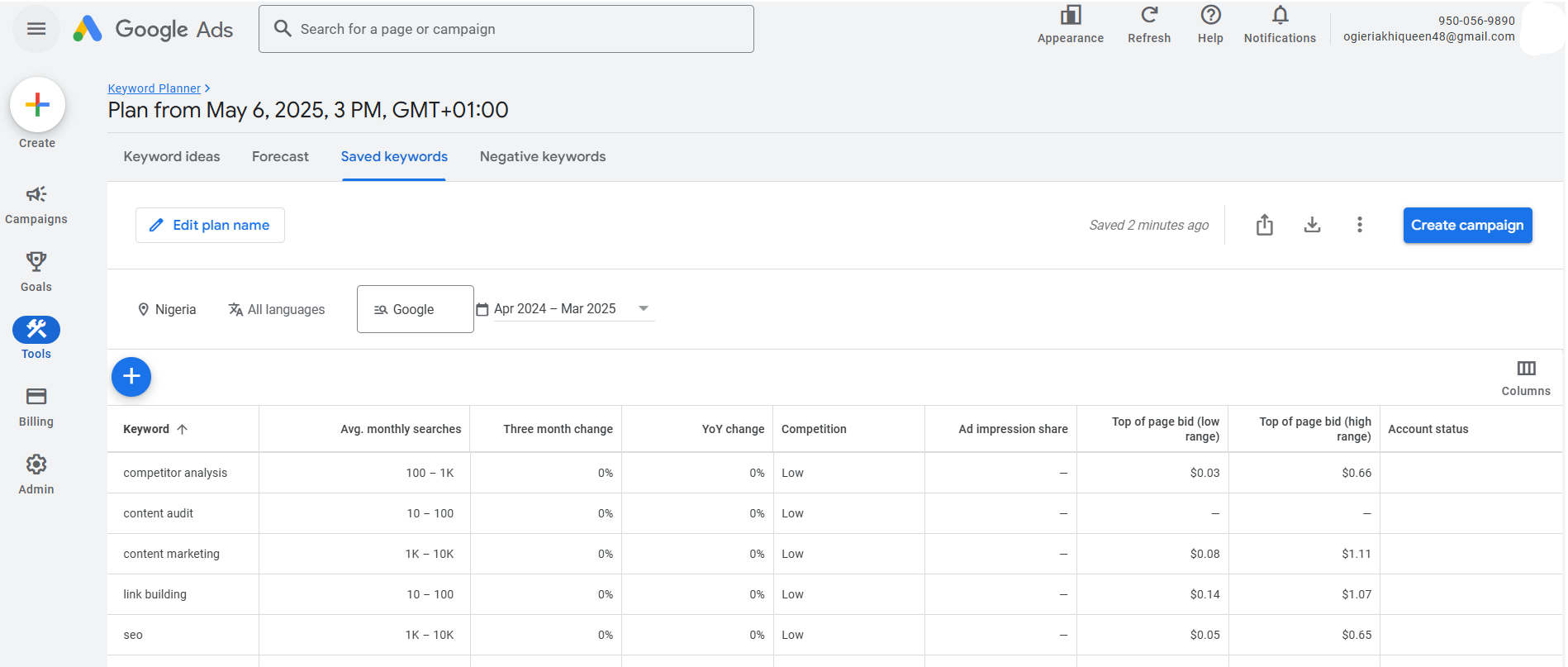
The tool’s interface allows you to adjust targeting settings (e.g., location, language, or date range) to refine results and align with campaign goals. Forecasts are refreshed daily, based on the past 7–10 days of data, adjusted for seasonality and market changes.
Significance
Google Keyword Planner holds significant value for both SEA and SEO, impacting digital marketing strategies in several ways:
- Keyword Research for SEO: GKP is a cornerstone for SEO professionals, enabling them to identify high-demand keywords and long-tail phrases to optimize website content. This improves organic search rankings and drives targeted traffic.
- Campaign Optimization for SEA: For advertisers, GKP provides critical data to select cost-effective keywords, estimate budgets, and maximize ad visibility. Its integration with Google Ads allows seamless transfer of keywords to campaigns.
- Competitor Analysis: By entering a competitor’s website URL, you can uncover your competitors’ keywords, revealing gaps or opportunities for your own strategies.
- Understanding User Intent: Keywords reflect searcher intent (informational, navigational, commercial, or transactional). GKP helps marketers align content with user needs, improving engagement and conversions.
- Cost-Effective Planning: Bid estimates and competition metrics allow businesses to prioritize keywords with high return on investment, especially for small budgets.
- Trend Analysis: The tool’s date range feature helps identify seasonal or trending keywords, enabling timely campaign adjustments.
Despite its strengths, GKP has limitations. It primarily serves advertisers, so SEO-focused data (e.g., organic competition) is limited, and search volume estimates are often provided in broad ranges rather than exact figures, especially for low-spending accounts. Additionally, it does not cover question-based keywords or non-advertised terms, requiring supplementary tools like Google Trends or third-party platforms (e.g., SEMrush, Ahrefs) for comprehensive research.
Use Cases
- E-commerce: Online stores use GKP to find keywords for product pages, such as “buy breathable running shoes,” to attract high-intent buyers.
- Content Marketing: Bloggers and content creators identify trending or niche keywords to craft relevant articles, boosting organic traffic.
- Local SEO: Businesses target location-specific keywords (e.g., “best restaurant near me”) to optimize for local search and mobile users.
- Competitive Research: Marketers analyze competitors’ keyword strategies to identify opportunities or underserved niches.
Limitations
- Restricted Access: A Google Ads account is required, and full functionality may be limited for non-paying users.
- Advertiser Focus: The tool prioritizes PPC data, lacking detailed SEO metrics like organic ranking difficulty.
- Broad Search Volumes: Non-paying or low-spending accounts receive search volume ranges (e.g., 10K–100K) rather than precise figures.
- Limited Question Coverage: GKP does not provide insights into question-based queries, which are vital for content strategies.
- Mobile Optimization: The tool is primarily designed for desktop use, making it less convenient for mobile users.
FAQ
What is Google Keyword Planner?
Google Keyword Planner is a free tool within Google Ads that helps users research keywords, estimate search volumes, analyze competition, and forecast campaign performance for SEA and SEO purposes.
Do I need to pay to use Google Keyword Planner?
No, GKP is free, but you need a Google Ads account. Some features, like precise search volumes, may be limited for non-paying or low-spending accounts.
How can I access Google Keyword Planner?
Sign in to your Google Ads account, click the “Tools” icon, select “Planning” from the menu, and choose “Keyword Planner.” You must complete account setup, including billing information, to access it.
What’s the difference between short-tail and long-tail keywords in GKP?
Short-tail keywords (1–2 words, e.g., “buy shoes”) have high search volume but lower conversion rates (15–20%). Long-tail keywords (2–5 words, e.g., “buy breathable running shoes”) have lower search volume but higher conversion rates (70–80%).
Can I use GKP for SEO, not just PPC?
Yes, GKP is widely used for SEO to identify keywords, estimate search volumes, and analyze trends. However, it lacks organic competition metrics, so supplementary tools may be needed.
How accurate are GKP’s search volume estimates?
Search volumes are estimates based on recent data (7–10 days) and adjusted for seasonality. For non-paying accounts, volumes are shown in broad ranges, reducing precision. Paying accounts may see slightly more detailed ranges.
Can GKP help with competitor analysis?
Yes, by entering a competitor’s website URL, you can generate keyword ideas based on their content, revealing their targeted terms and potential opportunities.
Why don’t I see exact search volumes?
Google limits exact search volumes to active, higher-spending Ads accounts to encourage ad spending. Non-paying or low-spending users receive broad ranges (e.g., 1K–10K).
Does GKP support languages other than English?
Yes, you can target keywords in various languages and regions by adjusting the language and location settings in the tool.
How often are GKP forecasts updated?
Forecasts are refreshed daily, based on data from the last 7–10 days, and account for market changes and seasonality.
Newsletter
Subscribe to our newsletter
Join our newsletter to be the first to access Nightwatch's cutting-edge tools, exclusive blog updates, and fresh wiki insights. Transform your online presence today!
